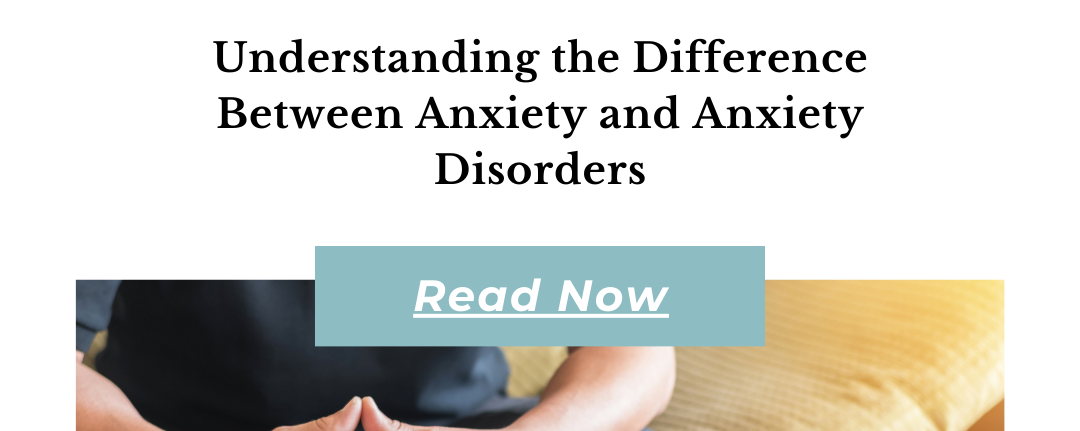Understanding the Difference Between Anxiety and Anxiety Disorders
Posted on 12th May 2023
Anxiety is a normal and natural response to stress or perceived danger. It's a feeling that almost everyone experiences at some point in their lives, whether it's before a big presentation or when facing a challenging situation. However, anxiety can also become debilitating when it's persistent, intense, and out of proportion to the situation. This is known as an anxiety disorder.
Anxiety disorders can take different forms, including generalised anxiety disorder, panic disorder, social anxiety disorder, obsessive-compulsive disorder, and post-traumatic stress disorder, among others. These disorders can cause a wide range of symptoms, including excessive worry, fear, avoidance, irritability, restlessness, insomnia, and physical symptoms such as sweating, trembling, and heart palpitations.
One of the key differences between normal anxiety and anxiety disorders is the level of impairment and distress that they cause. Normal anxiety tends to be short-lived and manageable, while anxiety disorders can interfere with daily functioning, relationships, and overall quality of life.
One of the key differences between normal anxiety and anxiety disorders is the level of impairment and distress that they cause. Normal anxiety tends to be short-lived and manageable, while anxiety disorders can interfere with daily functioning, relationships, and overall quality of life.
If you suspect that you may have an anxiety disorder and are struggling with day-to-day activities, there is professional help available. Anxiety disorders are treatable, and seeking help - whether it be professional, through friends and family or a community - is a sign of strength, not weakness.
There are different types of support available for people with anxiety disorders, including therapy, medication, and self-help strategies. Therapy can help individuals learn coping skills, challenge negative thoughts, and face feared situations. Medication, such as antidepressants or anti-anxiety medications, can be helpful in reducing physical symptoms. Self-help strategies, such as exercise, relaxation techniques, and mindfulness, can also be effective in managing anxiety.
Hypnotherapy can be a useful tool in treating anxiety, as it can help individuals access their subconscious mind and reframe negative thought patterns.
You can contact us today, at SanaMente Hypnotherapy, to learn more about our services and how we can help you overcome anxiety, as specialists in this area.

If you are looking for ways to manage feelings of anxiety, have a read of our top 10 tips below:
1. Practice deep breathing: Deep breathing exercises can help to reduce feelings of anxiety by slowing down your breathing and calming your nervous system. Try taking slow, deep breaths in through your nose and out through your mouth.
2. Exercise regularly: Exercise can help to reduce anxiety by releasing endorphins and improving your overall mood. Aim to engage in physical activity for at least 30 minutes a day.
A bonus to this would be incorporating the outdoors and nature into your chosen activity such as going for a brisk walk, outdoor swimming, hiking, football etc. Research has shown that exposure to nature can lead to a rapid reduction in stress, as evidenced by changes in muscle tension, blood pressure, and brain activity.
Spending time in green spaces has been found to significantly lower levels of cortisol, a hormone associated with stress. Moreover, being in nature can boost the production of endorphins and dopamine, which are chemicals that promote feelings of happiness.

3. Get enough sleep: Sleep is essential for both physical and mental health, and getting enough rest can help to reduce anxiety. Try to establish a regular sleep routine and aim for 7-8 hours of sleep per night.
4. Limit caffeine and alcohol: Caffeine and alcohol can both contribute to feelings of anxiety and may interfere with sleep. Limit your intake of these substances, especially in the evening.
5. Practice mindfulness: Mindfulness techniques, such as meditation and yoga, can help to reduce anxiety by promoting relaxation and reducing stress. Try practising mindfulness for at least 10 minutes a day.
6. Talk to someone: Talking to a trusted friend or family member about your feelings can help to alleviate anxiety and provide emotional support.
7. Challenge negative thoughts: Negative thoughts and beliefs can contribute to feelings of anxiety. Try to challenge these thoughts by asking yourself if they're realistic and looking for evidence to support or contradict them.
8. Take breaks: Taking regular breaks throughout the day can help to reduce stress and prevent burnout. Try to take short breaks to stretch, walk, or engage in relaxing activities.
9. Engage in enjoyable activities: Engaging in activities that you enjoy can help to boost your mood and reduce anxiety. Try to make time for hobbies, socialising, and other enjoyable activities.

10. Develop coping strategies that work for you: Coping strategies are techniques or behaviours that help you manage your emotions and reduce stress. Everyone is different, so it's important to experiment with different strategies to find what works best for you.
Some coping strategies that may be helpful in managing anxiety include exercise, meditation, deep breathing, journaling, listening to calming music, spending time in nature, and spending time with loved ones.
Additionally, it can be helpful to develop a self-care routine that incorporates healthy habits such as regular exercise, a balanced diet, and adequate sleep. With practice and perseverance, these coping strategies and top tips can become an effective way to manage feelings of anxiety and improve your overall wellbeing.
In conclusion, it's essential to understand the difference between normal feelings of anxiety and anxiety disorders. While anxiety is a natural and common experience, anxiety disorders can be debilitating and interfere with daily life. Taking steps such as practising mindfulness, exercising regularly, and seeking support from loved ones can help manage anxiety. With the right tools and support, it's possible to manage anxiety and lead a fulfilling life. Don't hesitate to reach out for help if you need it.
Tagged as: anxiety, emotions, fear, mindfulness, relationships, relaxation, self-care, sleep, stress
Share this post:


